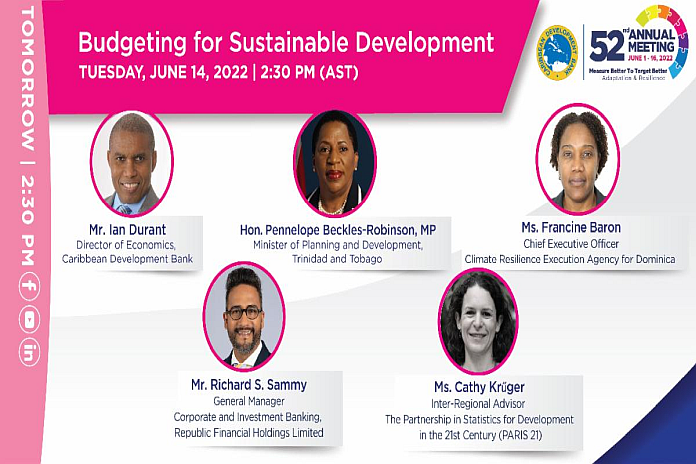BRIDGETOWN, Barbados – To assist the Caribbean Development Bank (CDB) membership in the development of national objectives and measuring their success in improving lives, the bank has assembled regional, global, private and public sector players who will examine public financial management and supportive actions to achieve the region’s development agenda.
“Administrations and policymakers in CDB Member Countries must focus on astute measurement and management while balancing the needs of people to achieve shared prosperity and close the gaps to the Sustainable Development Goals (SDGs)”, says director of economics at the CDB, Ian Durant.
Caribbean countries all have development plans linked to the Sustainable Development Goals (SDGs) which have set targets for 2030. Budgeting is a critical aspect of planning and development. Creating accounting models and strategies which offer innovative approaches to reporting and tracking development impact and attainment of the set goals can meaningfully feed into future strategies, benefit national economies and greatly assist in more accurate assessment of the distance from the SDGs.
In this regard, CDB has engaged Pennelope Beckles-Robinson, member of parliament and minister of planning and development, Trinidad and Tobago; Catherine Kruger, inter-regional advisor, the Partnership in Statistics for Development in the 21st Century (PARIS 21); Francine Baron, chief executive officer, Climate Resilience Execution Agency for Dominica and Richard S. Sammy, group vice president-designate, Republic Bank Financial Limited to share insight with the bank’s board of directors and stakeholders on the elements required to strengthen reporting and budgeting in Borrowing Member Countries to better reflect development commitments and progress.
Under the theme measure better to target better- adaptation and resilience, the seminar entitled, Budgeting for Sustainable Development will be held on June 14, 2022, at 2:30 pm in Providenciales, Turks and Caicos Islands (TCI).
The panel will examine the role of law-making, budgeting, oversight and stakeholder buy-in achieving allocative efficiency building on existing models and best practices in the public and private sectors. It will identify relevant strategies including the adoption of a results-based budgeting framework with SDG alignment by countries to strengthen their respective National Development Plans.
This approach will harmonise targets with those under the SDG 2030 Agenda. These efforts are critical to improve the lives and livelihoods of populations in a sustainable, inclusive, and equitable manner and is also an important step in the process of improving the region’s development landscape.





